

The Ocean Warming Enigma – Watts Up With That? From NOT A LOT OF PEOPLE KNOW By Paul Homewood h/t MrGrimNasty There has been a nice discussion on Twitter, regarding the GWPF’s latest bulletin inconveniently pointing out that there has been no global warming in the last 5 years: No, actually the world has warmed even in the last 5 yearsOcean heat content – a better indicator of warming of the climate system as a whole (per Levitus, Roger Pielke Snr, and many others) – shows an ongoing rising trend over decades and since pic.twitter.com/zBMS5WWCkI— Richard Betts (@richardabetts) January 15, 2021 But why does Richard Betts show a graph beginning in 1958, which implies that ocean warming suddenly started to accelerate after 1990?
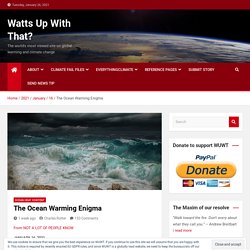
Although the graph is labelled in Zettajoules, designed to make it look scary, the actual temperature changes involved are microscopic, and impossible to measure to such accuracy in pre-ARGO days. Since 2004, for instance, ARGO data shows an increase of about one hundredth of a degree. 4.8 27 votes Article Rating. The Natural Warming Of The Global Oceans-Bob Tisdale. By Paul Homewood Many of you will be familiar with the work of Bob Tisdale over the years, concerning the mechanism of ENSO (ie El Ninos and La Ninas) and its effects on climate.
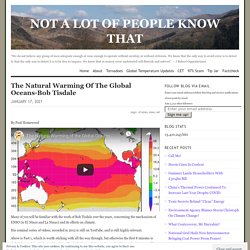
His seminal series of videos, recorded in 2012 is still on YouTube, and is still highly relevant. Above is Part 1, which is worth sticking with all the way through, but otherwise the first 8 minutes is definitely worth a watch. Bob Tisdale – Part 2. Schooled: Warmth-Sensitive Fish Teach Us They Swam In A 4-5°C Warmer Ocean About 5000 Years Ago. By Kenneth Richard on 6.

July 2020 Extensive hake (fish) skeletal remains in ocean waters too cold for this species to occupy today suggest past ocean temperatures were several degrees warmer. Fish habitats are limited by specific temperature boundaries. In a new study, for example, Wheeland and Morgan (2020) found there was a pronounced ocean warming from the 1980s to late 1990s off the coasts of Greenland. This temperature shift changed the distribution of halibut habitat.
Image Source: Wheeland and Morgan, 2020 In a new study, Bas et al. ( 2020) document a large presence of a temperature-sensitive fish species (hake) at 53°S (southernmost South America) when current hake venture no further south than 47°S. Image Source: Bas et al., 2020 Evidence for anomalously cold present-day sea surface temperatures in southern South America relative to past millennia has also been documented by Caniupán et al., 2014. Image Source: Caniupán et al., 2014. The ocean has become more stable and stratified thanks to global warming. From the INSTITUTE OF ATMOSPHERIC PHYSICS, CHINESE ACADEMY OF SCIENCES The global ocean has become more stratified and stable over the past few decades with global warming.
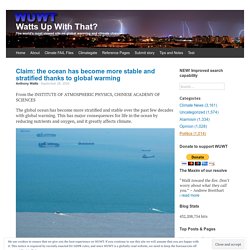
This has major consequences for life in the ocean by reducing nutrients and oxygen, and it greatly affects climate. A new study, by a group of international researchers from China and U.S., published in Nature Climate Change found that the global ocean has become more layered and resistant to vertical mixing as warming from the surface creates increasing stratification. Sea water generally forms stratified layers with lighter waters near the surface and denser waters at greater depth, i.e. warmer fresher waters atop colder more saline ones. This stable stratified configuration acts as a barrier to water mixing that impacts the efficiency of vertical exchanges of heat, carbon, oxygen and other constituents. Marine heatwaves are human made. Research News A marine heatwave (ocean heatwave) is an extended period of time in which the water temperature in a particular ocean region is abnormally high.

In recent years, heatwaves of this kind have caused considerable changes to the ecosystems in the open seas and at the coast. Their list of negative effects is long: Marine heatwaves can lead to increased mortality among birds, fish and marine mammals, they can trigger harmful algal blooms, and greatly reduce the supply of nutrients in the ocean. Throwing More Cold Water On An Alarmist Ocean-Warming Paper.
The deep sea is slowly warming. Research News WASHINGTON–New research reveals temperatures in the deep sea fluctuate more than scientists previously thought and a warming trend is now detectable at the bottom of the ocean.
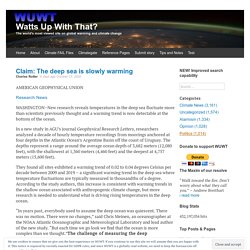
In a new study in AGU’s journal Geophysical Research Letters, researchers analyzed a decade of hourly temperature recordings from moorings anchored at four depths in the Atlantic Ocean’s Argentine Basin off the coast of Uruguay. The depths represent a range around the average ocean depth of 3,682 meters (12,080 feet), with the shallowest at 1,360 meters (4,460 feet) and the deepest at 4,757 meters (15,600 feet). The Ocean Warms By A Whole Little. Guest Post by Willis Eschenbach [see update at the end] How much is a “Whole Little”?
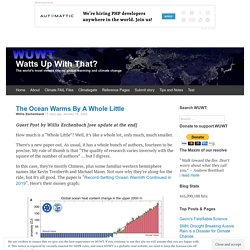
Well, it’s like a whole lot, only much, much smaller. There’s a new paper out. As usual, it has a whole bunch of authors, fourteen to be precise. Unsettled: Scientists Find Ocean Heat Change Rate And Earth’s Energy Imbalance In DECLINE Since 2000. According to a new paper, the Earth’s ocean heat content time derivative (OHCTD) has been decreasing (-0.26 W/m²/decade) since 2000, coinciding with a similar deficit in the Earth’s energy imbalance (EEI).
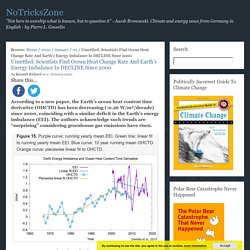
The authors acknowledge such trends are “surprising” considering greenhouse gas emissions have risen. Image Source: Dewitte et al., 2019 Earth’s energy budget imbalanced? Three Graphs: Long-term temperature of the oceans. News Brief by Kip Hansen — 30 November 2019 A recent study in Oceanography, the Official Magazine of The Oceanography Society, titled “Atlantic warming since the Little Ice Age” [.pdf here], is interesting in its entirety, with an Abstract as follows: “Radiocarbon observations suggest that the deep Atlantic Ocean takes up to several centuries to fully respond to changes at the sea surface.
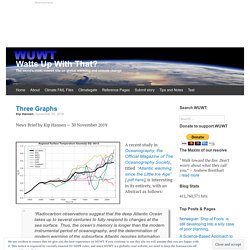
Ocean Temperature Changes Are Uneven And Uncertain. A new paper from the Global Warming Policy Foundation looks at how scientists monitor changes in ocean temperature and finds a story of huge uncertainties and surprising findings.
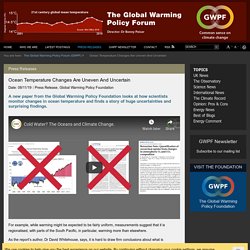
For example, while warming might be expected to be fairly uniform, measurements suggest that it is regionalised, with parts of the South Pacific, in particular, warming more than elsewhere. As the report’s author, Dr David Whitehouse, says, it is hard to draw firm conclusions about what is happening in the seas: “The oceans can absorb far more heat than the atmosphere, so temperatures changes are extremely small and therefore hard to measure reliably.” New IPCC report on ocean warming cites a flawed and retracted paper. Via Retraction Watch: A major new report about the dramatic warming of the oceans cites a 2018 Nature paper on the topic that was retracted earlier this week — the same day, in fact, that the report dropped.
But one of the authors of that paper tells Retraction Watch that the Intergovernmental Panel on Climate Change (IPCC) Special Report, released September 25, must have meant to cite a different paper by the same authors. The report concluded that: It is virtually certain that the global ocean has warmed unabated since 1970 and has taken up more than 90% of the excess heat in the climate system (high confidence). Serious Errors In IPCC Ocean Report Revealed. In a letter to the IPCC, Dr Benny Peiser, the GWPF’s director, has highlighted a number of errors and misinterpretations in the IPCC’s report which are based, to a significant degree, on a flawed study which was recently retracted. In his letter, Dr Peiser points out that the IPCC’s overall conclusion on ocean heat uptake “is based to a significant degree on a paper by Cheng et al. (2019) which itself relies on a flawed estimate by Resplandy et al. (2018). An authors’ correction of this paper and its ocean heat uptake estimate was under review for nearly a year, but in the end Nature requested that the paper be retracted (Retraction Note, 2019).
Early 20th century global warming. By Judith Curry A careful look at the early 20th century global warming, which is almost as large as the warming since 1950. Until we can explain the early 20th century warming, I have little confidence IPCC and NCA4 attribution statements regarding the cause of the recent warming. This is an issue that has long interested me. Peter Webster wrote a previous post Mid 20th Century Global(?)
Update Jan.22: Hot Ocean False Alarm. Scare of the Day: Ocean Heat Content. Comparison of global climatologies confirms warming of the global ocean. Institute of Atmospheric Physics, Chinese Academy of Sciences IMAGE: Deployment of an APEX float from a German research ship. Credit: Argo. Ocean Temperature Data. Warmer Than Thought? GWPF Science Editor Sceptical About New Ocean-Warming Paper. There is a Wide Range in the ARGO-Era Warming (and Cooling) Rates of the Oceans to Depths of 2000 Meters. Warmer Than Thought? GWPF Science Editor Sceptical About New Ocean-Warming Paper. A new report published in the US journal Science, led by the Chinese Academy of Sciences, suggests the world’s oceans are warming 40 percent faster than what a UN panel predicted five years ago.
Although data collection is more accurate than in the past, some experts advise against jumping to hasty conclusions. Deep Ocean Warming in Degrees C. Is ocean warming accelerating faster than thought? By Nic Lewis *** UPDATE : response to comments by Zeke Hausfather appended. Ocean Heat Content Surprises. By Judith Curry. Media Reports of +40% Adjustment in Ocean Warming Were Greatly Exaggerated. From Dr Roy Spencer’s Blog January 16th, 2019. Ocean Warming: Inadequate Data, Unknown Errors. A major problem with the Resplandy et al. ocean heat uptake paper.
By Nic Lewis Obviously doubtful claims about new research regarding ocean content reveal how unquestioning Nature, climate scientists and the MSM are. Resplandy et al. Part 2: Regression in the presence of trend and scale systematic errors. Resplandy et al. Part 3: Findings regarding statistical issues and the authors’ planned correction. By Nic Lewis Introduction The Resplandy et al. (2018) ocean heat uptake study (henceforth Resplandy18) is based on measured changes in the O2/N2 ratio of air sampled each year, compared to air stored in high pressure tanks originally sampled in the late 1980s and early 1990s, and in atmospheric CO2 concentration.
These are combined to produce an estimate (ΔAPOObs) of changes in atmospheric potential oxygen since 1991 (ΔAPO). They break this series down into four components, including one attributable to ocean warming (ΔAPOClimate). Resplandy et al. Part 4: Further developments. Resplandy et al. Part 5: Final outcome. By Nic Lewis. Admitting mistakes in a ‘hostile environment’ MATH ERROR: Scientists Admit ‘Mistakes’ Led To Alarming Results In Major Global Warming Study. Retracted Ocean Warming Paper & the IPCC. Oops. The oceans are warming, fast! Resplandy et al. paper shows how peer review can fail, even at Nature. “Hothouse Earth” status assessed – By ignorant climatologists! News Media Gave Blanket Coverage To Flawed Climate Paper - The Global Warming Policy Forum (GWPF)The Global Warming Policy Forum.
Oceans have absorbed 60% more heat than previously thought. UK Media Refuses To Correct The Record On Flawed Climate Paper - The Global Warming Policy Forum (GWPF)The Global Warming Policy Forum. Scientists Acknowledge Key Errors In Study Of How Fast The Oceans Are Warming - The Global Warming Policy Forum (GWPF)The Global Warming Policy Forum.